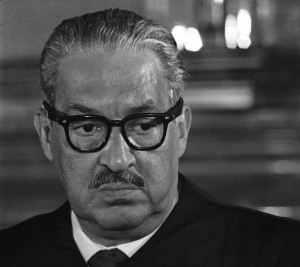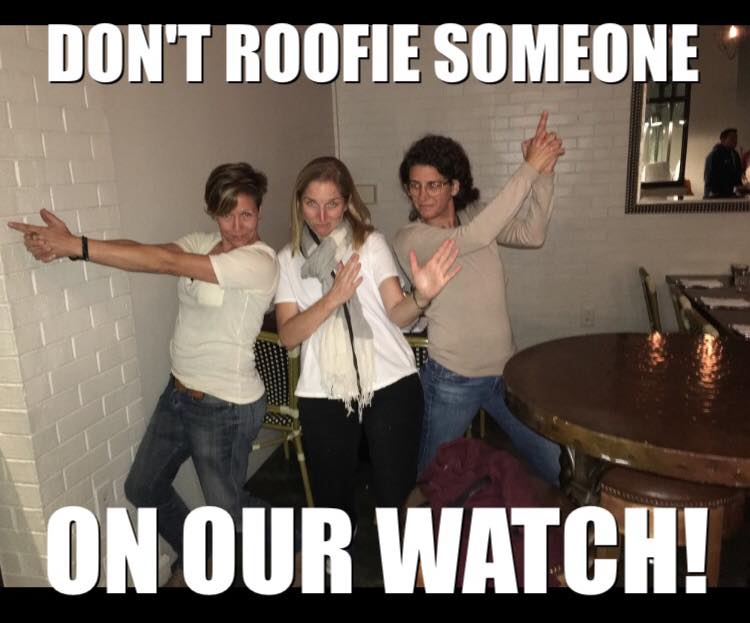Flap Your Lips Friday
Posted by Michelle Moquin on 1st July 2016
Good Morning!
Another write about another Wonderful Woman Of The World. From ThinkProgress:
The Supreme Court’s ‘Wise Latina’ Notches Her First Key Victory
Twenty-five years ago on Wednesday, the greatest lawyer of the twentieth century confronted his own mortality.
“I’m old,” Justice Thurgood Marshall told a room full of reporters. “I’m getting old and falling apart.” The man who time and time again had forced Jim Crow to retreat using only the power of his own arguments was leaving the Supreme Court.
Justice Marshall’s retirement left a void on the nation’s highest Court for nearly two decades. Marshall was, as Justice Sandra Day O’Connor wrote the year after his retirement, “a man who knew the anguish of the silenced and gave them a voice.” This was a man who’d personally faced lynch mobs while struggling to save innocent black men from a death sentence, a lawyer of unmatched skill and poise who was chased out of Southern towns with warnings that “n*ggers ain’t welcome in these parts after dark.”
Thurgood Marshall, Justice O’Connor wrote, continuously forced his colleagues on the Supreme Court to “respond not only to the persuasiveness of legal argument but also to the power of moral truth.”
Justice Thurgood Marshall (AP Photo, File))
At a superficial level, Justice Sonia Sotomayor is an unusual candidate to take up Marshall’s mantle. Princeton and Yale-educated, Sotomayor began her career as a prosecutor before representing clients such as Fendi and Ferrari.
And yet, Sotomayor’s early work as an assistant district attorney gave her a unique insight into just how easy it is for police and prosecutors to abuse their power. As NYU Law Professor Rachel Barkow writes, Sotomayor’s “experience as an assistant district attorney and trial judge” appears “to have made her attuned to the need for checks on government power.” The justice’s “view in criminal cases is firmly grounded in how things actually work in practice” and “how real people interact with criminal justice policies in the vast majority of cases in the system.”
More than just a voice of criminal defendants who are often pushed around by a system designed to empower law enforcement, however, Sotomayor has also embraced Marshall’s role as the Court’s teller of difficult truths about race. During her confirmation hearing, conservatives tore into Sotomayor for saying in a 2001 speech that she would “would hope that a wise Latina woman with the richness of her experiences would more often than not reach a better conclusion than a white male who hasn’t lived that life.” But her tenure on the bench has shown that there is wisdom in these remarks. Sotomayor is one of only three people of color who have sat on the Supreme Court, and she brings a perspective that was long absent in the justices’ conference room.
“It is no secret that people of color are disproportionate victims” of humiliating police scrutiny, Sotomayor wrote in a dissenting opinion last week in Utah v. Strieff. “Race matters,” Sotomayor wrote two years earlier, in response to conservative colleagues who insist that the only way to eradicate racism is to ignore the fact that race exists.
Race matters to a young man’s view of society when he spends his teenage years watching others tense up as he passes, no matter the neighborhood where he grew up. Race matters to a young woman’s sense of self when she states her hometown, and then is pressed, “No, where are you really from?”, regardless of how many generations her family has been in the country. Race matters to a young person addressed by a stranger in a foreign language, which he does not understand because only English was spoken at home. Race matters because of the slights, the snickers, the silent judgments that reinforce that most crippling of thoughts: “I do not belong here.”
These words, like her warning about racial injustice in Strieff, were written in a dissenting opinion. Yet they also presaged one of Sotomayor’s greatest — and most unexpected — triumphs.
The Triumph
No one thought Fisher v. University of Texas at Austin would turn out the way it did.
Fisher was a case, spearheaded by the same activist behind the Court’s decision gutting much of the Voting Rights Act, targeting affirmative action in university admissions. When Fisher first reached the Supreme Court in 2012, few people expected race-conscious admissions programs to survive contact with the justices. Oral arguments in the case, where potential swing-voter Justice Anthony Kennedy complained that the University of Texas had created an admissions program where “what counts is race above all,” only heightened this sense that affirmative action was on its death bed.
Then Sonia Sotomayor stepped up to the plate.
According to Supreme Court reporter Joan Biskupic, the justices initially split 5-3 after the 2012 oral arguments in Fisher (Justice Elena Kagan was recused), with the majority intending to strike down UT’s affirmative action plan. In response, Sotomayor “drafted a dissent suffused with the personal experience of her Puerto Rican Bronx background.” The justice’s message to her conservative colleagues, according to Biskupic, could be summarized as “you haven’t lived it and you don’t get it.”
With tensions growing within the Court, Justice Stephen Breyer, a center-left Clinton appointee, saw an opportunity to broker a compromise, and he eventually convinced Kennedy to pen a more moderate opinion allowing affirmative action to survive another day. Seven of the eight justices hearing this case eventually signed on to this opinion.
The justice’s message to her conservative colleagues . . . could be summarized as “you haven’t lived it and you don’t get it.”
Yet, while Kennedy’s first Fisher opinion permitted the University of Texas to continue using race as a small factor in its admissions process, it was widely viewed as nothing more than a stay of execution for affirmative action. The opinion returned the case to one of the most conservative federal appeals courts in the country, and it did so with instructions that no affirmative action may survive judicial review unless there are “no workable race-neutral alternatives would produce the educational benefits of diversity.” Sotomayor and Breyer’s efforts may have bought affirmative action a few more years, but the writing on the wall still seemed to show that race-conscious admissions was on its death bed.
Flash forward to last Thursday, when Kennedy handed down his second opinion in the Fisher litigation. “Something strange has happened since our prior decision in this case,” Justice Samuel Alito complained in response to Kennedy’s opinion. He had a point. For the first time in nearly 30 years on the Supreme Court, Kennedy voted to uphold a race-conscious admissions program. Affirmative action was saved.
Justice Sotomayor, for her part, played only a small supporting role in Fisher‘s final chapter. She quietly joined Kennedy’s majority opinion without writing an additional word. But she did not need to. The groundwork she’d laid the last time Fisher was before the Court delivered a result that once seemed impossible.
The Struggle
Yet, despite her quiet success in Fisher, Sotomayor spends far more time in dissent than she does building unexpected majorities. At a time when much of the nation is awakening to the extra burden people of color carry within our criminal justice system, Sotomayor is a lonely voice — often a voice speaking only for herself and no other justice — about the need for greater checks on prosecutors, prison officials and law enforcement.
Just weeks into her second term on the Court, Sotomayor took up the case of Anthony Pitre, a Louisiana inmate engaged in a self-destructive protest — after Pitre was transferred against his will to a particular prison facility, he protested the decision by refusing to take his HIV medication. Prison officials allegedly retaliated against this decision by “subjecting him to hard labor in 100-degree heat,” duties he could not safely perform in his weakened medical state.
Both a trial court and an appeals court rejected Pitre’s plea for lighter duty. A magistrate judge even labeled his claims “frivolous” and wrote that Pitre was “hoist by his own petard” for exacerbating his own medical condition to the point where he was unable to perform hard labor. The Supreme Court voted not to hear Pitre’s case, with Sotomayor as the lone voice registering dissent.
Citing “the principle that a competent person has a constitutionally protected liberty interest in refusing unwanted medical treatment” and precedents establishing that prisons may not inflict “punitive treatment [that] amounts to gratuitous infliction of ‘wanton and unnecessary’ pain,” Sotomayor offered scorn for the magistrate judge’s approach to this case. “I cannot comprehend how a court could deem” Pitre’s allegations “frivolous,” she wrote.
“To be sure, Pitre’s decision to refuse medication may have been foolish and likely caused a significant part of his pain,” Sotomayor admitted. “But that decision does not give prison officials license to exacerbate Pitre’s condition further as a means of punishing or coercing him.”
Sotomayor similarly took up the charge of Israel Leija, a man who allegedly was unlawfully shot and killed by a police officer after leading police on a high-speed chase and threatening to shoot at them if they maintained pursuit. In an unsigned order, a majority of the Court held that the officer who killed Leija was immune from suit because he did not “violate clearly established statutory or constitutional rights of which a reasonable person would have known.”
Only Sotomayor dissented. The officer, she wrote, “fired six rounds in the dark at a car traveling 85 miles per hour. He did so without any training in that tactic, against the wait order of his superior officer, and less than a second before the car hit spike strips deployed to stop it.” This, she added, is simply not allowed. “It is clearly established that the government must have some interest in using deadly force over other kinds of force” before it can take lethal action against a suspect. Even dangerous criminals have this right.
Neither Pitre nor Leija was a sympathetic litigant. One was a convicted criminal who willfully endangered his own health and then demanded an accommodation for doing so. The other behaved recklessly and directly threatened police. But Sotomayor’s insight in both cases was that no one loses their constitutional rights because they are unsympathetic — or even because they may have behaved badly.
This, after all, is the core insight behind a Constitution that protects the rights of the criminally accused — individuals that, by their very nature, are likely to be unsympathetic.
*****
The forum is now open.
Talk to me.
Happy Friday!
Lastly, greed over a great story is surfacing from my “loyal”(?) readers. With all this back and forth about who owns what, that appears on my blog, let me reiterate that all material posted on my blog becomes the sole property of my blog. If you want to reserve any proprietary rights don’t post it to my blog. I will prominently display this caveat on my blog from now on to remind those who may have forgotten this notice.
Gratefully your blog host,
michelle
Aka BABE: We all know what this means by now :)
If you love my blog and my writes, please make a donation via PayPal, credit card, or e-check, please click the “Donate” button below. (Please only donations from those readers within the United States. – International readers please see my “Donate” page)
Or if you would like to send a check via snail mail, please make checks payable to “Michelle Moquin”, and send to:
Michelle Moquin PO Box 29235 San Francisco, Ca. 94129
Thank you for your loyal support!
All content on this site are property of Michelle Moquin © copyright 2008-2016
“Though she be but little, she be fierce.” – William Shakespeare Midsummer Night’s Dream
" Politics, god, Life, News, Music, Family, Personal, Travel, Random, Photography, Religion, Aliens, Art, Entertainment, Food, Books, Thoughts, Media, Culture, Love, Sex, Poetry, Prose, Friends, Technology, Humor, Health, Writing, Events, Movies, Sports, Video, Christianity, Atheist, Blogging, History, Work, Education, Business, Fashion, Barack Obama, People, Internet, Relationships, Faith, Photos, Videos, Hillary Clinton, School, Reviews, God, TV, Philosophy, Fun, Science, Environment, Design, The Page, Rants, Pictures, Church, Blog, Nature, Marketing, Television, Democrats, Parenting, Miscellaneous, Current Events, Film, Spirituality, Obama, Musings, Home, Human Rights, Society, Comedy, Me, Random Thoughts, Research, Government, Election 2008, Baseball, Opinion, Recipes, Children, Iraq, Funny, Women, Economics, America, Misc, Commentary, John McCain, Reflections, All, Celebrities, Inspiration, Lifestyle, Theology, Linux, Kids, Games, World, India, Literature, China, Ramblings, Fitness, Money, Review, War, Articles, Economy, Journal, Quotes, NBA, Crime, Anime, Islam, 2008, Stories, Prayer, Diary, Jesus, Buddha, Muslim, Israel, Europe, Links, Marriage, Fiction, American Idol, Software, Leadership, Pop culture, Rants, Video Games, Republicans, Updates, Political, Football, Healing, Blogs, Shopping, USA, Class, Matrix, Course, Work, Web 2.0, My Life, Psychology, Gay, Happiness, Advertising, Field Hockey, Hip-hop, sex, fucking, ass, Soccer, sox"
Posted in Good Reads and Good See'ds, Political Powwow, Wonderful Women Of The World | 20 Comments »




















